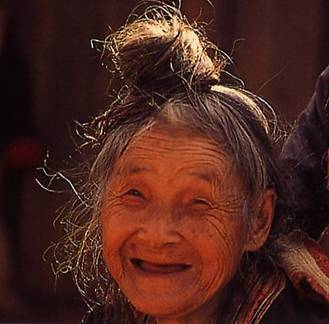|
|
Grandmothers Find It Difficult to Be Mothers Again
Marwaan Macan-Markar
March 4, 2005

Boon Srimai's tranquil life as a grandmother was shattered three years ago when death struck her family twice. Within a space of months in 2002, her 34- year-old son and his wife died of AIDS.
Suddenly, Boon, who was 60 years at the time, found herself being a mother all over again. She had to care for her orphaned granddaughter, Methini.
And she is not the only grandmother having to shoulder such a responsibility in her village of largely rice farmers on the outskirts of this city in the northern hills of Thailand. There are three more ageing women caring for their grandchildren orphaned by the killer disease.
As she reflects on this change in her life, Boon conveys streaks of love in bringing up Methini despite mounting hardships that come with age and her state of economic deprivation. ''I want to care for her, see that she eats well, goes to school. But it is not easy because I am getting old and we have little money,'' says Boon.
In villages that surround her own, similar sentiments are heard by grassroots activists who have been helping grandparents affected by the trail of deaths that AIDS has left. ''It is a very sad situation for the older people at many levels,'' Apideth Chairacha, projects coordinator of the Community Care Network (CCN), told IPS.
''At a time when they should be taking it easy, enjoying the support from their children's incomes, they have been forced to work, do anything, to earn money to take care of their orphaned grandchildren,'' he said.
Currently, the CCN is assisting close to 150 ageing men and women who are taking care of their grandchildren who have lost one or both parents to the killer disease. The children in their charge range from newborns to those in their late teens.
These senior citizens are among an estimated 220,000 grandparents caring for children affected by AIDS in northern Thailand, states the Asia-Pacific office of HelpAge International (HAI), the global network of non-governmental organisations working to help older people across the world lead a better life.
Some of those caregivers in this region, the worst affected by HIV/AIDS since the pandemic began spreading through this South-east Asian country in the early 1980s, are over 70 years old, HAI adds.
Close to 460,000 people have died in this country since the beginning of the pandemic, stated the United Nations Development Programme (UNDP) in a study on the impact of HIV/ AIDS in Thailand released during last year's international AIDS conference. In 2003, alone, there were 53,000 deaths.
And an estimated one million people have been infected by HIV, the virus that leads to AIDS, since cases were first reported in Thailand in the early 1980s, adds the U.N. agency's report.
Still for all, the debilitating impact AIDS is having on the country's oldest generation remains a largely ignored or marginalised one. Such disregard by governments and even international agencies and the donor community towards grandparents caring for AIDS orphans is true elsewhere too.
''The link between HIV/AIDS and older people remains a marginal issue in this region and in others places,'' Godfred Paul, HAI's Asia-Pacific regional project manager, said in an interview. ''There is still very little support from governments for older people affected by AIDS. And even the international donor community is still not sensitive to funding programmes on AIDS and older people.''
In fact, last year's international AIDS conference held in Bangkok tried to make amends for this lapse by becoming the first major global gathering on AIDS to address the impact the pandemic was having on senior citizens.
''That was the first time organisers at an international meeting on AIDS took up this issue,'' added Paul. ''There was a sub-track on AIDS and ageing included at the conference.''
Yet such recognition of the vital role grandparents are playing in developing countries affected by AIDS has not translated to concrete measures eight months after that international event.
''If the caregivers, the older people's role is not seriously acknowledged even now when we have 40 million people with AIDS, when will it be,'' lamented Paul. ''This generation needs help, because most of them depended on their children's income during old age. That money is no more due to AIDS -- and these older people have the orphans to care for.''
The need for money to care for orphaned grandchildren has even compelled some older people in the Chiang Mai area to work for 12 to 14 hours daily producing handicrafts for the local markets.
In addition, grandparents as caregivers for AIDS orphans are also vulnerable in another regard - discrimination due to the stigma attached to the lethal disease.
''Some of them become victims of stigmatisation,'' Prasert Techaboon, a 38-year-old who is living with HIV, told IPS.
Yet that has not stopped the older people from caring for their grandchildren affected by AIDS, he added. ''They see it as their responsibility to care for the children. It is part of the culture. But the government must help them.''
Sixty-three-year-old Boon is typical of such a generation keeping alive a pillar of support in Asia's developing countries -- a safety net offered by an extended family in times of distress.
''It is difficult to be a mother again at my age, but I must for Methini,'' she says.
|
|



